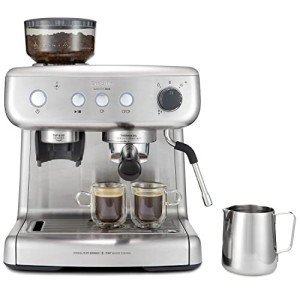This Is The Ultimate Guide To High-Quality Espresso Machines
The World of High-Quality Espresso Machines: A Comprehensive Guide
Espresso has become a precious beverage amongst coffee lovers worldwide, known for its abundant taste, intense scent, and flexibility. The heart of an excellent espresso lies in the machine used to brew it. High-quality espresso machines are designed to provide the perfect shot, making them a necessary financial investment for coffee enthusiasts. This article explores different types of high-quality espresso machines, their features, upkeep pointers, and responses to frequently asked questions.
Kinds Of High-Quality Espresso Machines
High-quality espresso machines fall under a number of classifications, dealing with various preferences, ability levels, and budgets. The primary types include:
Type of Machine
Description
Ideal User
Manual Espresso Machines
Needs user skill to control extraction and pressure. Uses the most control over the brewing procedure.
Experienced baristas and lovers
Semi-Automatic Machines
Combines manual operation with automation. Users control the grind and tamping, while the machine deals with water dispersion.
Intermediate users
Automatic Espresso Machines
Automate the brewing process, permitting programmable developing times and temperatures.
Casual coffee drinkers
Super-Automatic Machines
Have built-in grinders and are completely automated, managing everything from grinding to brewing and steaming.
Users looking for convenience
Commercial Espresso Machines
Developed for high volume use in cafes and dining establishments, using toughness and speed.
Company owner
Comprehensive Overview of Each Type
Manual Espresso Machines
- Pros: Complete control over the developing process; can produce remarkable quality espresso.
- Cons: Requires significant skill; lengthy.
Semi-Automatic Machines
- Pros: Balanced control, blending manual and automatic procedures; exceptional quality espresso is still achievable.
- Cons: Requires some knowledge and experience to master.
Automatic Espresso Machines
- Pros: User-friendly; decreases the discovering curve while still producing high-quality espresso.
- Cons: Still needs some understanding of coffee-making basics.
Super-Automatic Machines
- Pros: Maximal benefit; little ability needed; perfect for individuals or households who desire coffee without fuss.
- Cons: Higher cost point; might do not have the fine-tuning capabilities of manual machines.
Commercial Espresso Machines
- Pros: Built for longevity and efficiency; frequently includes features for high-volume turns.
- Cons: Expensive; may be overkill for home use.
Secret Features to Consider
When searching for a high-quality espresso machine, numerous essential features should be taken into consideration:
- Pressure and Pump Type: Look for machines with a minimum of 9 bars of pressure, which is necessary for extracting the very best flavor from coffee beans.
- Boiler Type: Single, double, and heat exchanger boilers each impact how the machine performs and the speed of developing.
- Build Quality: High-quality products such as stainless steel are more suitable for sturdiness and aesthetic appeals.
- Ease of Use and Cleaning: Some machines require comprehensive cleansing, while others are developed for easy upkeep.
- Temperature Control: Consistent temperature is crucial; consider machines with PID controllers for accurate control.
Benefits of High-Quality Espresso Machines
Buying a high-quality espresso machine uses a wide range of advantages:
- Superior Quality: High-end machines enable greater control, causing more delicious espresso.
- Toughness: Built to last, quality machines need fewer repair work and replacements.
- Personalization: Users can delight in a customized experience by changing grind size, shot timing, and other settings.
- Increased Convenience: Automatic and super-automatic alternatives enable aficionados to delight in espresso with very little effort.
Upkeep and Care for High-Quality Espresso Machines
To keep an espresso machine working efficiently, routine maintenance is important. Here are pointers for preserving a high-quality espresso machine:
Descale Regularly:
- Use a descaling option every few months to prevent buildup of minerals from water, which can impact taste and performance.
Clean the Brew Group:
- For machines with a removable brew group, clean it frequently to guarantee a tidy extraction.
Replace Water Filters:
- Use a water filter and alter it as required to minimize impurities in your developing water.
Daily Cleanings:
- Rinse the portafilter and group head after each use to prevent oil accumulation.
Watch on the Parts:
- Monitor seals, gaskets, and other parts for wear and tear and replace them as needed.
Often Asked Questions (FAQs)
1. What is the very best espresso machine for beginners?
For newbies, a semi-automatic machine typically provides a good balance of functionality and control, allowing users to find out the skills needed for making great espresso.
2. Are please click the following internet site -automatic machines worth the financial investment?
Yes, for those who focus on convenience and ease over control, super-automatic machines can be a deserving investment, particularly for families or busy specialists.
3. Just how much should I anticipate to invest in a high-quality espresso machine?
High-quality espresso machines vary substantially in price, with manual machines starting at a few hundred dollars, while super-automatic or commercial machines can surpass numerous thousand.
4. Can I make other coffee drinks with an espresso machine?
Yes, many espresso machines have steam wands or attachments that allow users to produce lattes, cappuccinos, and more.
5. How long do espresso machines typically last?
With appropriate maintenance, high-quality espresso machines can last over a years, making them a long-term financial investment in your coffee pleasure.
High-quality espresso machines yield a transformative coffee experience, whether delighted in in your home or in a commercial setting. By comprehending the types readily available, their functions, and the upkeep required to keep them running effectively, consumers can make educated decisions that raise their coffee-drinking experience.
